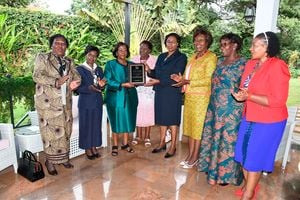
Pregnant schoolgirls. Zimbabwe has been left scrambling for answers following revelations that a staggering 4,500 girls were forced to drop out of school last year alone in a country that is also battling a scourge of child marriages.
Zimbabwe has been left scrambling for answers following revelations that a staggering 4,500 girls were forced to drop out of school last year alone in a country that is also battling a scourge of child marriages.
According to the country’s Education Ministry, some of the girls who fell pregnant were in primary school.
The statistics may come as a shock, but Zimbabwe was already faced with a culture of child marriages where children as young as 10 are married off to older men in traditional settings that have resisted modern laws.
The practice is prevalent among indigenous churches where men are allowed to marry multiple women.
“For the year ending December 2023, some 4,557 girls dropped out of school due to pregnancy, the majority of these (3 942) being from rural schools,” Primary and Secondary Education Minister, Torerai Moyo, told Parliament this week.
“There were 134 girls who dropped out of primary school as a result of pregnancy, which means that the majority of dropouts were recorded in primary schools.”
Zimbabwe’s laws allow for girls, who drop out of school, to return to class once they give birth. But most would already be married off, limiting chances of resuming education.
Mr Moyo said hundreds of girls have been allowed to return to school since 2000 when the laws were changed.
“It is now their right to education, so they are supposed to return to school,” he said. “I do not think we have any challenges for students, who have not been allowed to return to school.
“Perhaps they have received a lot of criticism from their peers for returning to school. So, precisely quite several students have been accepted back and have gone back to school.
“After giving normal birth, the girl is allowed back to school according to the constitution.”
Zimbabwe’s 2022 population census revealed that 133, 435 women aged between 20 and 24 years were married before attaining the age of 18.
The proportion was higher at 22.7 percent in rural areas compared to 7.2 percent in urban areas, the census report said.
Girls Not Brides, a coalition of civil society organisations that campaign against child marriages, said 34 percent of girls in Zimbabwe are married before the age of 18 and five percent are married before their 15th birthday.
“Daughters are sometimes married off to reduce their perceived economic burden, with their bride price used by families as means of survival,” the coalition said.
“Fifty percent of girls married before the age of 18 are from the poorest households in comparison to 14 percent from the richest households.
“Many girls drop out of school because their parents cannot afford to pay school fees, which in turn puts girls at higher risk of being married off.
“Sixty-six percent of girls married before the age of 18 had no or pre-primary education, 57 percent had primary education and five percent had completed higher education.”
Indigenous apostolic churches encourage girls as young as 10 to marry much older men for ‘spiritual guidance.” The young girls become part of polygamous marriages.
Zimbabwe has seen an upsurge in teen pregnancies in recent years largely because of deepening poverty. The United Nations Population Fund (UNFPA) says 350,000 girls aged between 10 and 19 fell pregnant between 2019 and 2022.
A National Assessment of Adolescent Pregnancies in Zimbabwe (2023) funded by the United Nations established that of the 1.7 million antenatal care bookings recorded between 2019 and 2022, 358,000 were of girls aged between 10 and 19.
Blessing Nyagumbo, a UNFPA adolescent sexual reproductive health specialist, said the study identified various causes of teen pregnancies, which in most cases were of girls forced into early marriages.
“(The causes) include adolescents’ limited knowledge of sexuality, poverty, limited parent-to-child communication, early sexual debuts among adolescents themselves and cross-generational (with elderly men) and cultural and religious practices such as marrying off girls at very tender ages,” Ms Nyagumbo said.
The report said during the period under review, teens that fell pregnant comprised 10 to 14 year-olds which constituted 0.9 percent with 15 to 19 year olds making up 41.2 percent.
There was also a significant proportion of pregnancy prevalence between religions with those whose families were from protestant churches making up 14, 5 percent, Pentecostal (15.8 percent), apostolic (31.5 percent), and other (classified as an African religion, Muslim and no religion) taking up 34.5 percent, the report says.
The median age for the sexual debut was found to be 16 years and the middle (50 percent) was between 15 and 17 years.
About 31 percent of the girls who were surveyed reported having had forced sex on their first sexual encounter.
In 2016, Zimbabwe’s Constitutional Court outlawed child marriages after ruling that no one can get married before the age of 18.
However, in 2022 the same court declared that the country’s Criminal Law Code did not adequately protect children between the ages of 16 and 18 from sexual exploitation.
The court gave the government a year to enact a law protecting all children against sexual exploitation, but it has yet to do so.
Legal experts this week said the statistics released by the Education ministry showing a high number of girls dropping out of school due to pregnancy showed that the lack of a specific law against sexual exploitation of children left them vulnerable.
“It is appalling that children should be left unprotected in this way,” said Veritas Zimbabwe, an organisation that tracks legal statutes and the work of Parliament.
“No doubt many of them were impregnated by fellow pupils but at least some of them must have been victims of sexual predation by older men.
“Those victims were not protected by the criminal law as a result of the government’s inaction following the Constitutional Court’s order.
“Now teenagers are again left unprotected as a result of inaction, this time the government’s failure to bring remedial legislation into force.”
For a long time, public health advocates in Zimbabwe have been pushing the government to give adolescents access to reproductive health services and education.







